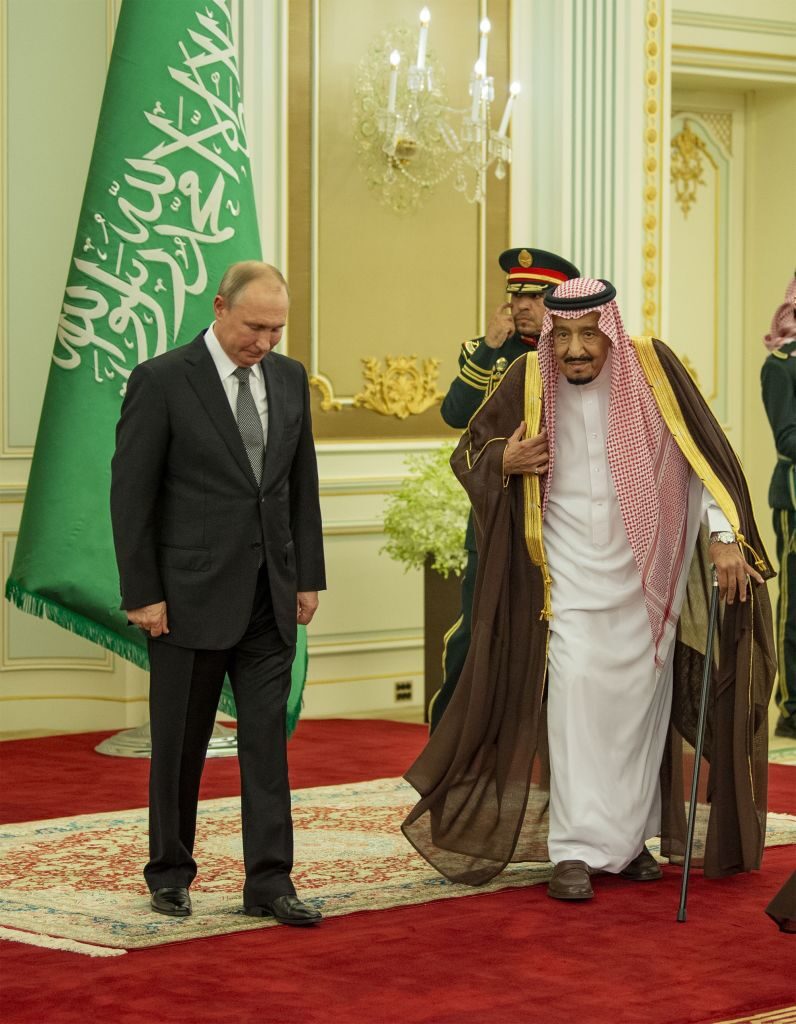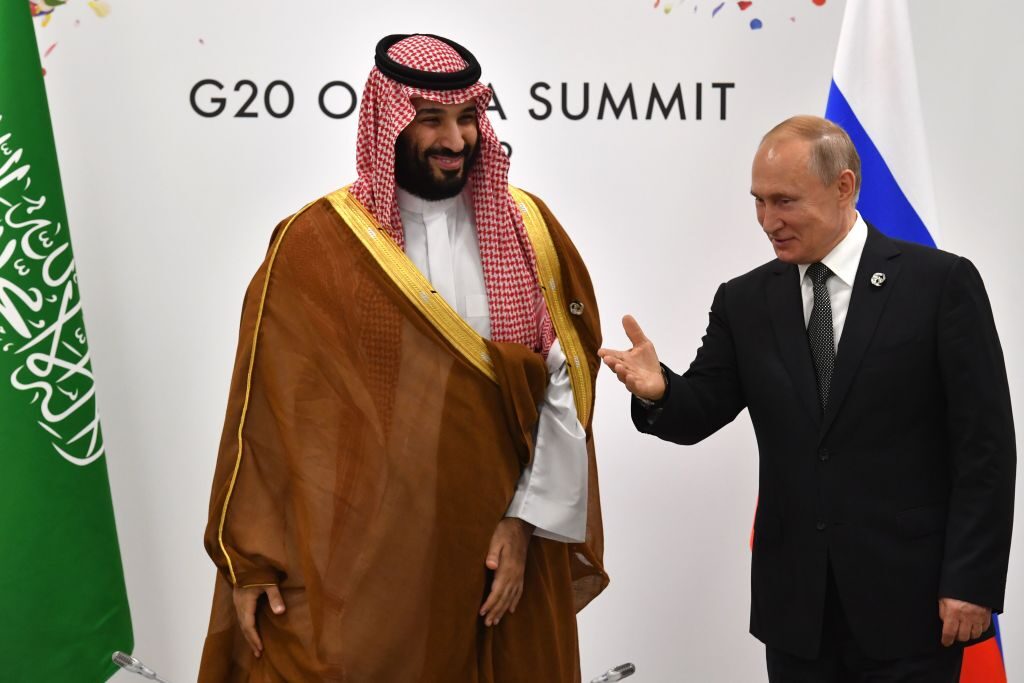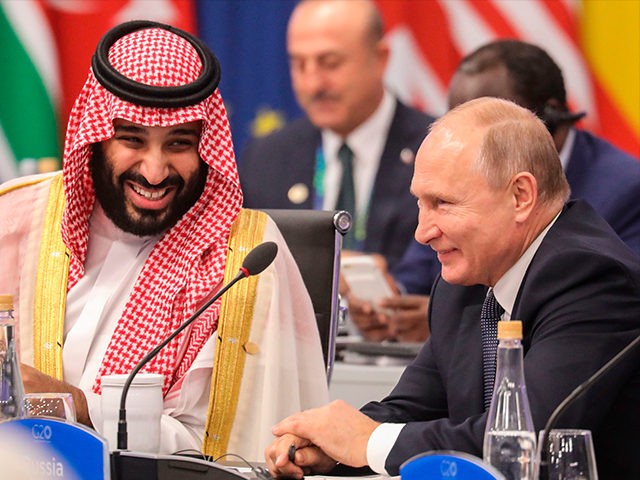Saudi Crown Prince Mohammed bin Salman expressed support to Russian leader Vladimir Putin in a phone call on Tuesday following the bizarre events of this weekend, when the head of the Wagner mercenary group threatened to march into Moscow and take over the Defense Ministry.
Russia is still reeling from the announcement on Friday night by Wagner Private Military Company (PMC) leader Yevgeny Prigozhin claiming that the Defense Ministry, and Defense Minister Sergei Shoigu specifically, ordered an attack on his fighters stationed in Ukraine. Wagner has been pivotal in Russia’s ongoing invasion of the neighboring country but Prigozhin has consistently condemned the Defense Ministry for not sufficiently supporting Wagner or its own soldiers.
Prigozhin announced that he would lead his troops out of Ukraine into Russia, claiming he had about 25,000 mercenaries behind him, and reportedly entered the city of Rostov-on-Don, where a critical Defense Ministry base is located. The Putin regime charged Prigozhin with armed mutiny, a crime for which he could be jailed for up to 20 years, and Putin himself vowed in an address to the nation that all involved in the revolt would face severe punishment.
By Saturday night, however, Prigozhin had turned around and the Kremlin announced an agreement that would allow Prigozhin to leave for Belarus in exchange for an end to the rebellion. Radical leftist dictator Alexander Lukashenko of Belarus had reportedly brokered the agreement. As of Tuesday, Prigozhin has published only one more audio message, on Monday, insisting he was not attempting to overthrow Putin or stage a coup; media reports have not confirmed Prigozhin’s location at press time. The Russian government did, confirm, however, that it closed its case against Prigozhin for armed mutiny.

File/Russian President Vladimir Putin (L) is welcomed by Saudi Arabia’s King Salman bin Abdulaziz al-Saud (R) with an official ceremony at the Al-Yamamah Palace in Riyadh, Saudi Arabia on October 14, 2019. (Anadolu Agency via Getty Images)
Saudi Arabia was among a host of Middle Eastern states to maintain contact and express support for Putin throughout the brief crisis. The leaders of the United Arab Emirates (UAE), Qatar, Syria, and Iran also called Putin or publicly issued statements of support for the Russian government in other ways.
Mohammed bin Salman, the Saudi crown prince, called on Tuesday.
“Due to the events in Russia on June 24 Mohammed bin Salman Al Saud expressed support for measures to protect the constitutional order, life and security of citizens taken by the Russian leadership,” the Kremlin said in a readout on Tuesday, according to the Russian news agency Tass.
The Saudi Press Agency reported that the crown prince applauded Putin’s handling of the situation, stating Saudi Arabia’s government was “satisfied with the success of the de-escalation efforts.”
Russia and Saudi Arabia have gradually expanded their warm relations during the presidency of leftist American head of state Joe Biden, who vowed as a candidate to turn the kingdom into a “pariah” state over the gruesome killing of Islamist Washington Post columnist Jamal Khashoggi. Prior to Biden’s remarks, Saudi Arabia was a longtime reliable American ally and Russia enjoyed far closer relations to Saudi Arabia’s top geopolitical rival, Iran.
The amount of Russian fuel oil imported by Saudi Arabia between April and June of this year more than doubled compared to last year, Reuters reported on Friday. https://t.co/YfISPfzT7y
— Breitbart News (@BreitbartNews) July 17, 2022
In August 2021, just eight months into the Biden presidency, Riyadh announced that it had signed a deal with Russia to “strengthen the military and defense cooperation between out two countries.” In the aftermath of the Russia “special operation” to oust democratically elected Ukrainian President Volodymyr Zelensky, Saudi Arabia dramatically increased the amount of Russian oil it purchased, benefitting from discounted prices as a result of sanctions. Some reports indicate that Riyadh may be buying up cheap Russian crude oil, refining it, and selling it to the European Union at a markup, inserting sanctioned Russian oil into the EU market.
The Saudi government’s growing relationship with Russia has alarmed Washington, which in turn has outraged Saudi leaders even further by accusing them of supporting the Ukraine invasion. In a particularly grating diplomatic episode, the Saudi government, considered the de facto leader of the oil cartel OPEC+, supported a major 2-million-barrel-per-day production cut last year, prompting Biden officials to claim that Saudi Arabia was attempting to keep oil prices high to benefit Russia.
“Look, it’s clear that OPEC+ is aligning with Russia with today’s announcement,” White House press secretary Karine Jean-Pierre said at the time.
The Saudi Foreign Ministry condemned the insult in a stern and extended press release. Adding to the embarrassment for the Biden administration, Zelensky personally thanked Saudi Arabia for supporting the Ukrainian cause shortly thereafter.
“Spoke to Crown Prince of Saudi Arabia Mohammed bin Salman. Thanked for supporting Ukraine’s territorial integrity, resolution at the UN General Assembly,” Zelensky said. “We agreed to interact in the release of [Ukrainian] prisoners of war. We agreed on the provision of [Saudi] macro-financial aid to Ukraine.”

File/Russia’s President Vladimir Putin (R) gestures toward Saudi Arabia’s Crown Prince Mohammed bin Salman during a meeting on the sidelines of the G20 Summit in Osaka on June 29, 2019. (YURI KADOBNOV/AFP via Getty Images)
Saudi Arabia on Tuesday joined a parade of Mideast nations issuing public votes of confidence for Putin. Also on Tuesday, UAE President Mohamed bin Zayed al-Nahyan spoke to Putin, reportedly emphasizing “the need to preserve stability in Russia” in light of the Wagner mutiny.
“On Monday, the Kremlin press service reported that Putin had held a telephone conversation with his UAE counterpart,” Tass reported. “According to the press service, Sheikh Mohamed bin Zayed Al Nahyan expressed his full support for the Russian leadership’s actions with regard to the June 24 mutiny attempt.”
The emir of Qatar, Sheikh Tamim bin Hamad Al Thani, reportedly called Putin on Monday. Doha had sent its prime minister and top diplomat to Moscow just last week. Rather than only discussing the Wagner situation, the two leaders discussed mutual cooperation, particularly in trade.
“Both sides noted the high level of Russian-Qatari cooperation and confirmed mutual interest in its further strengthening in various spheres,” the Kremlin said.
Russia’s two closest allies in the Middle East, Syria and Iran, also extended support to the Putin regime. In Damascus, dictator Bashar al-Assad welcomed Russian Deputy Foreign Minister Sergey Vershinin and affirmed his support for the invasion of Ukraine. Tass did not report that Assad commented on the mutiny, but did note that Syria supported Russia’s alleged “fight against terrorism.”
“Iranian President Ebrahim Raeisi has expressed the Islamic Republic’s support for Russia’s national sovereignty following the aborted mutiny by the paramilitary Wagner group,” Iran’s state-run PressTV reported on Monday. Raisi reportedly blamed “extra-regional forces” for tensions in Ukraine and Russia, apparently implying, without evidence, an American or Western role in the Wagner episode.

COMMENTS
Please let us know if you're having issues with commenting.